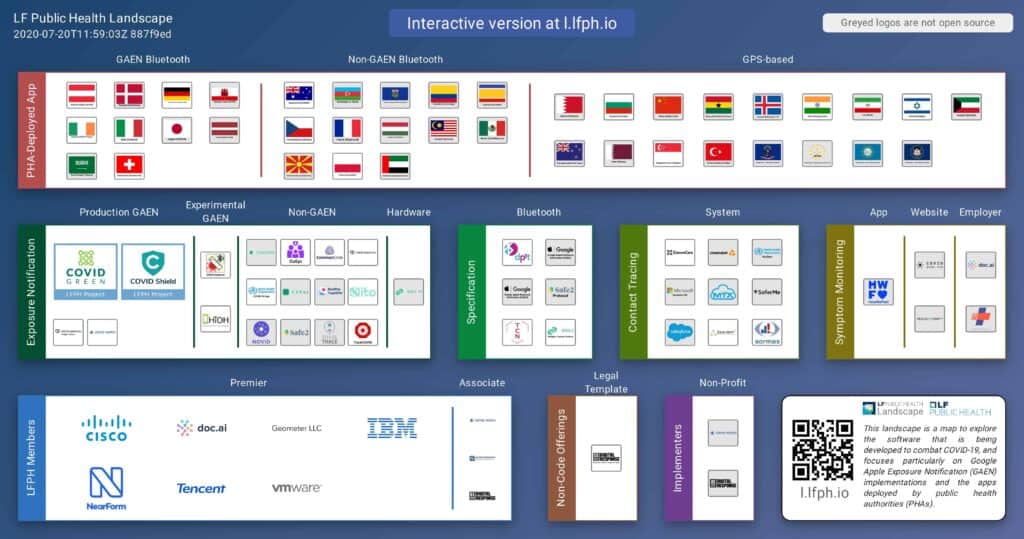This is the English translation of an article written in Chinese and published on July 23, 2020.
The COVID-19 pandemic has created an unprecedented challenge to our society, and every industry is trying its best to adapt and combat this public health crisis. The IT industry has also come up with technology-based solutions to help public health authorities contain the coronavirus.
On July 23, Tencent, announced its participation in the launch of the Linux Foundation Public Health (LFPH) program as a founding premier member, with the goal to fight the global pandemic with open source technology. The program will help public health authorities (PHAs) around the world to combat COVID-19 and any future infectious diseases through deploying open source and shared technologies.
Alexander Ng, the vice president of Tencent Health, said in the press release: “Tencent is glad to join LFPH as a founding member, and we look forward to collaborating closely with international public health agencies and technology leaders to improve public health and contribute to the fight against COVID-19 and future public health challenges.”
Mark Shan, chair of Tencent Open Source Alliance, also suggested that, “When the Linux Foundation initiated the public health project at the start, Tencent Open Source, with its expertise and knowledge in open source, hoped to support and contribute to the open source collaboration in the global public health sector.”
The Linux Foundation Public Health Initiative is launching with 7 premier members – Cisco, doc.ai, Geometer, IBM, NearForm, Tencent, and VMware. LFPH will initially focus on hosting the open source technology for contact tracing and then move into all aspects of health-related technologies to fight the pandemic. Currently, COVID Shield and COVID Green have played vital roles in battling the pandemic in Canada, Ireland, and several U.S. states, and these two key applications have become open-sourced through LFPH.

At this critical moment, the global tech community is proving its importance and value in solving the global health crisis. The open source community provides an open platform for developers to contribute technical wisdom and effective measures for controlling the pandemic. It also provides an innovative way for the world to respond to major public health crises across borders and languages.
“During this grave global crisis, I’m committed to having all parts of the Linux Foundation community support LFPH,” added Linux Foundation executive director Jim Zemlin. “Open source provides an architecture for global collaboration and that’s what’s needed to build, secure, and sustain critical components of our stressed public health infrastructure.”
Chairman and CEO of Tencent Pony Ma has stated on many occasions that Tencent hopes to invest more in scientific research and actively participate in building a global technological community through utilizing the open source model internally and externally. At present, Tencent has joined 9 major open source foundations as their platinum members and has donated many outstanding open source projects. On GitHub, the world’s largest code hosting platform, Tencent has released more than one hundred open source projects, covering areas in medicine, big data, AI, cloud computing, and more, and it has accumulated more than 300,000 stars on the repositories. All of these illustrate the popularity of Tencent’s open source projects and its status as one of the open source enterprises with international influence.
Additionally, Tencent has continued to contribute its strengths in tech to open source and has integrated the successful practices of containing COVID-19 in China into code to help people around the world with developing preventative measures and others. When the outbreak happened in January 2020, Tencent assisted the World Health Organization to help governments of different countries develop digital medical solutions. The company has open-sourced the international version of Tencent Health’s COVID-19 Live Updates system that provides information such as the number of active cases and the COVID-19 Self-Triage Server that helps users to check the possibility of COVID-19 infection. These are examples of the technologies shared by Tencent with the world. In essence, these technologies help developers and health service providers quickly build query services and translate relatively complex medical guidelines into more accessible dialogues that contain important health information for the general public, as demonstrated in the below screenshots.

COVID-19 Self-Triage Server that incorporates AI can help people assess their risks of contracting the disease
Recently, together with the respiratory disease research team at Guangzhou Medical University in China, Tencent co-published a research paper on a deep learning-based survival model that can predict the probability of COVID-19 patients developing critical illness within 5, 10, and 30 days. The research result provides a prediction model with higher accuracy and reliability than the traditional methods, which can help patients receive appropriate treatments more efficiently. The code for the prediction model is available on GitHub.

Published in Nature Communications, the research paper is a collaborative effort between Guangzhou Medical University and Tencent AI Lab.
“To catalyze this open source development, Linux Foundation Public Health is building a global community of leading technology and consulting companies, public health authorities, epidemiologists and other public health specialists, privacy and security experts, and individual developers,” said Dan Kohn, LFPH general manager, in a statement. “While we’re excited to launch with two very important open source projects, we think our convening function to enable collaboration to battle this pandemic may be our biggest impact.”
